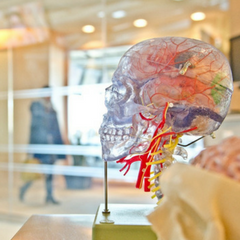
Heads Up for Brain Injury Awareness Month
This month is, among other things, Brain Injury Awareness month. In a bid to raise awareness about traumatic brain injuries and how they impact people’s lives, the theme for this month is ‘Not Alone’.
According to the Brain Injury Association of America, over 3.5 billion people – adults and children – sustain an acquired brain injury, every, single, year. Brain injuries aren’t something people are born with, they’re not hereditary or degenerative.

Brain Injuries Can Happen to Anyone
That’s right, brain injuries can occur for a number of reasons, to absolutely anyone. Among the more common causes of brain injuries are:
- Infectious Disease
- Electric Shock
- Near Drowning
- Oxygen Deprivation (Hypoxia/Anoxia)
- Seizure Disorders
- Post Traumatic Stress Disorder
- Substance Abuse
- Toxic Exposure
- Trauma
- Tumours
- Concussion
As you can see, brain injuries really can affect anyone at all, who happens to be unlucky enough to be in the wrong place at the wrong time, or contract an illness that deteriorates that far.
Because of the way in which anyone can be affected by brain injuries, often without warning, the resulting change and distress it can cause are widely unknown. And that’s why Brain Injury Awareness Month began.
Raising Awareness That Brain Injuries…
...can affect, not only the individual with the brain injury, but their friends and family. This is part of the ‘Not Alone’ theme. Not only are sufferers of brain injuries not alone, as the statistics clearly show, but their family and friends aren’t either.

Symptoms of a severe brain injury can sometimes take time to develop and other times they are obvious very quickly. In both cases, there is hope for rehabilitation, but not without much confusion change and upset.
Even if someone who suffers with a severe brain injury does recover, it’s unlikely that they will be 100% as they were before the injury. Lasting symptoms of severe brain injury include:
- Thinking and thought process
- Memory
- Learning
- Coordination and balance
- Speech, hearing or vision
- Emotions
Brain Injuries of All Types Are Difficult for Everyone Involved
It’s hard for the person who has suffered the injury. They can feel unsure, lose confidence and not feel like themselves, sometimes for a long time.
Friends, family and loved ones often find it hard to see the person they knew struggling with a whole host of problems that stem from the brain injury they’ve received. Those problems can include: being in pain or discomfort, forgetting people they know well, not being able to manage basic physical functions alone.
It’s important to try and come to terms with the person who has suffered the brain injury and support them in any way you can. Of course, you can try and help with any recommended exercises to help rehabilitate their brain. But sometimes, just turning up for a visit or making a phone call can help the sufferer, their family and it can help you too. You can spend time getting to know them again and becoming close again.
How to Prevent Severe Brain Injuries

Unfortunately, you can’t completely prevent all severe brain injuries, but there are a lot of things you can do to minimise the likelihood of you or your loved ones ever having a severe brain injury.
General safety tips include:
- Always wear a seatbelt when in a moving vehicle.
- Close supervision of children when they’re in water.
- Wear a helmet when partaking in sports, particularly, horse rising, cycling, scootering and boxing or combat sports.
- Never drive when under the influence of alcohol or drugs.
If you want to find out more about Brain Injury Awareness Month or severe brain injuries, take a look at the list of resources below.
https://www.headway.org.uk/about-brain-injury/
https://www.cdc.gov/headsup/basics/concussion_danger_signs.html
http://www.nctsn.org/resources/public-awareness/national-brain-injury-awareness-month%20
http://www.brainline.org/content/multimedia.php?id=7966
http://dvbic.dcoe.mil/brain-injury-awareness-month-march-2017
Sources:
Brain Injury Awareness Month
http://www.neurorestorative.com/knowledge-center/headsup
Not alone theme
http://www.biausa.org/brain-injury-awareness-month.htm#FactSheet
A lot of things you can do

